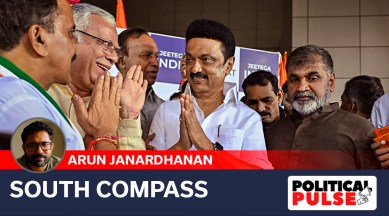‘Hear this voice from South India’: How planned podcast fits into Stalin’s pitch
DMK chief says he will “speak for India”, take on BJP; another step in the Tamil Nadu CM's efforts to project himself as the face of alternative governance, representing the South.

If Prime Minister Narendra Modi has Mann ki Baat, Tamil Nadu Chief Minister M K Stalin will soon have his own podcast series called ‘Speaking for India’ – with a difference. In Stalin’s words, as he put it Thursday: “Prepare to hear this voice from South India.”
Growing out of his late father M Karunanidhi’s looming image, Stalin has taken one more step towards adopting the mantle of a leader who represents the South and commands space on a national platform.
Stalin has already behind him an ‘All India Social Justice Forum‘, floated by him in February 2022, with the goal of uniting the Opposition against “bigotry and religious hegemony”, and “protecting the interests of the oppressed”.
The DMK chief had written to 37 political parties, inviting them to be part of the forum, seen at the time as an alternative unity bid as the Opposition looked around for the same.
This April, Stalin sought to lead a national consensus on another issue, appealing to CMs of non-BJP ruled states to pass resolutions seeking that the power of state governors, and its limitations, be defined.
The same month, the All India Social Justice Forum organised a conclave in Chennai, which was attended by 20 political parties.
Stalin announced his podcast plans in a video released on social media Thursday, saying: “In the past few months, I’ve been sharing my thoughts with you through ‘Ungalin Oruvan (One Among You)’. The DMK is now in its 75th year and stands as the third-largest party in Parliament. Leaders like Annadurai and Karunanidhi have shaped our party into what it is today. These are unprecedented times when it’s more important than ever to speak up for India. The BJP government’s term will end with the 2024 Lok Sabha elections. We need to discuss the ways they have already damaged India, and how we can revive the nation based on the principles of harmony and brotherhood. To continue this important dialogue, I am considering launching an audio series. I’m thinking of titling it ‘Speaking for India’. Prepare to hear this voice from the South of India.”
Like his other ventures, this makes Stalin’s podcast as much a foray into the ideological space, as political, with the CM seeking to be a voice representative of the South and its distinct Dravidian ideology, contrasting it to the BJP’s politics.
Soon after he took charge as CM in May 2021, Stalin had added the words ‘Belongs to Dravidian Stock’ to his Twitter profile, harking back to a speech made by C N Annadurai in Parliament 59 years ago.
He constantly projects his governance style as “Dravidian Model of government”, proclaiming the same in newspapers, including the national media, as well as in Assembly speeches.
In May 2022, the DMK organised a workshop for party workers titled ‘Dravidian Model is the National Model’ in Coimbatore, where former Union minister A Raja directly pitted the Dravidian model against the BJP’s ‘Aryan model’, calling the latter “regressive and divisive”.
Recent excavations in Tamil Nadu on the Sangam civilisation, dating its historicity to around the same time as the Indus Valley settlements, also fit into this DMK narrative. Supported by the Stalin-led government, these excavations indicate a culture distinctive and as rich as the north, challenging the BJP’s pan-India perspective.
On a more personal level, the podcast helps Stalin build himself as a communicator with direct connect to the people. The DMK chief is not seen as a mass leader of the kind Karunanidhi and the late AIADMK supremo J Jayalalithaa were, both of whom earned their stripes in popular Tamil cinema.
Beyond Karunanidhi too, the DMK has a rich history of orators, first arising from fiery stage performances and then moving on to cinema. Over its history, the party has owned studios, groomed its own actors and writers, and nurtured a battalion of “platform speakers”, who acted as “influencers” for the party back in the day.
Annadurai was a theatre artiste himself, who leveraged multiple mediums – film, theatre, and journalism – to spread the party’s ideology. Karunanidhi was a party writer, who penned movie scripts, besides fiction and non-fiction works.
Stalin has struggled to find his feet in this aspect. “Even though he has been consistent in video messages, he has wrestled with the problem of reconciling the DMK’s traditional ideals of social justice, equality and Tamil pride with mediums known for their intimacy and immediacy as they are now. That is how we zeroed in on podcasts. Here, we found a focal point: revising the ‘Idea of India’ ahead of the 2024 Lok Sabha elections,” a DMK office-bearer who is part of Stalin’s communication team said.
“The BJP has destroyed India’s social fabric,” the leader added. “We aim to position ourselves with a call to all of India for unity.”